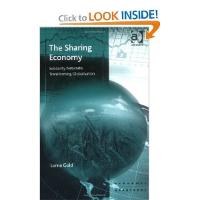The Sharing Economy: Solidarity Networks Transforming Globalization
Lorna Gold, Ashgate Economic Geography Series, agosto 2004

At the start of the new millennium, the feeling of hopefulness which marked the dawn of this new era has darkened sharply. Ancient divisions have re-emerged, exposing the fragility of a globalised world in which there is little sense of being part of a global community. Globalised economic injustice, rooted in a widely-held belief about the place of economic life in modern societies, and its reliance on ‘self-interest’, seems to have eroded any aspirations for a different kind of society. This book examines the origins and experience of a radical alternative to the current globalised economy. The Economy of Communion, which started within the Focolare Movement in Brazil in 1991, involves some 800 businesses and civil society organisations in a global network of solidarity, building a vibrant global community in which the values of sharing, caring and justice flourish. In this absorbing book, Lorna Gold uncovers the historical and philosophical origins of this fascinating, yet virtually unknown global community. Drawing on the varied experiences of business and community leaders from around the globe, and from Brazil and Italy in particular, the book examines the potential of this emerging alternative economic geography to offer a new vision of globalisation.
Table of Contents
1 In search of alternative economic geographies 15
2 The place of religion in economic geography 34
3 An emerging global community : the Focolare movement 48
4 An alternative economic vision 69
5 The evolution of the economy of communion 82
6 Spirituality and the economy of communion businesses 109
7 Transforming business space 124
8 Making space for sharing : local-global networks 146
9 Rethinking culture and economy : lessons from the EOC 164
10 Challenging perceptions of justice : the needs of ‘distant strangers’ 178
11 Postscript : from ‘grassroots’ to ‘global’ 191
